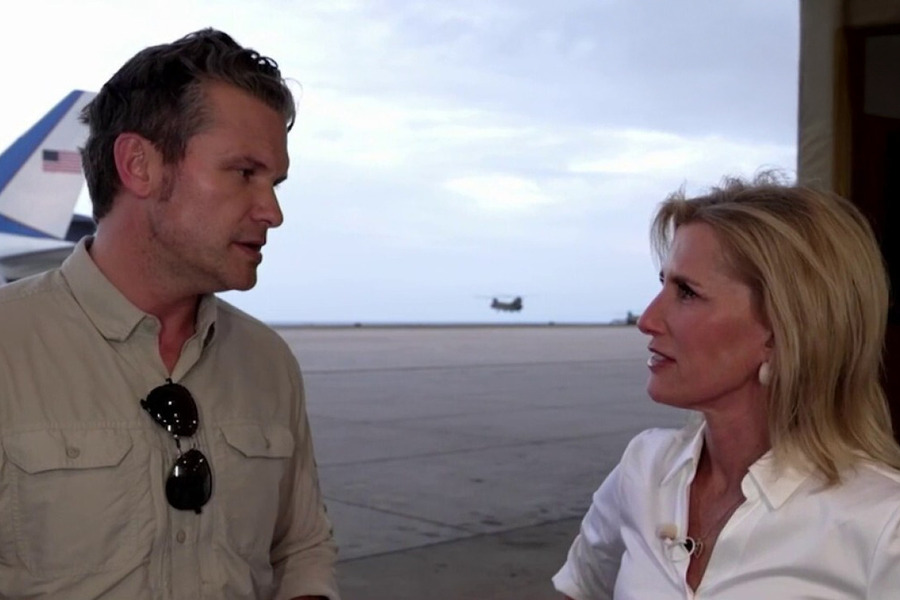Fox News host Laura Ingraham was granted exclusive access to the U.S. Naval Station Guantánamo Bay this week, joining Defense Secretary Pete Hegseth as he toured the facility now being used to detain certain illegal migrants as part of the Trump administration’s immigration enforcement strategy.
The visit was featured on Wednesday’s episode of The Ingraham Angle, where Ingraham documented her early morning departure from Joint Base Andrews en route to the 45-square-mile base in southeastern Cuba. Known primarily for housing terrorism suspects following the September 11, 2001, attacks, the base is now also being utilized to temporarily detain individuals accused of illegally entering the United States.
President Donald Trump authorized the use of the facility for immigration-related detentions shortly after taking office in 2017. In January of this year, he proposed expanding Guantánamo’s capacity to hold up to 30,000 detainees, signalling a more aggressive approach to immigration enforcement. Ingraham stated during her segment that flights of illegal immigrants have been arriving at the base regularly, describing it as a staging ground before deportation.
Secretary Hegseth, confirmed to his post in January, is a former U.S. Army lieutenant who previously served at Guantánamo from 2004 to 2005 with the New Jersey National Guard. This trip marked his first return in an official capacity. During the visit, he received operational briefings from base officials, including those overseeing the detention of deported migrants awaiting repatriation.
Hegseth addressed recent media reports alleging substandard or inhumane treatment of detainees. Specifically referencing a report by The Washington Post, he dismissed the claims as false. “This idea that people are being mistreated is absolute garbage,” he said. Hegseth acknowledged that conditions at the facility are austere but maintained that all basic amenities are provided. He added that detainees receive medical care, dental evaluations, welfare checks, and recreation opportunities.
In recent weeks, the U.S. has deported hundreds of Venezuelan nationals from Guantánamo Bay. According to Fox News Digital, approximately 200 Venezuelan migrants were repatriated last week following discussions with the Venezuelan government. Earlier this month, two additional flights transported 190 Venezuelan citizens from U.S. facilities back to their home country. U.S. officials have alleged that some of the detainees are affiliated with the Tren de Aragua gang, a Venezuelan criminal organization linked to violent activity.
Shortly after Ingraham arrived at the base, a flight from Fort Bliss landed, carrying nine high-value detainees. Hegseth described the operation as professional and efficient, reflecting on his own military experience at the facility. He noted that the base plays a vital role in safeguarding national security by isolating individuals who pose a high threat level.
During the visit, Ingraham questioned Hegseth about the administration’s approach to combating drug cartels and human trafficking operations at the southern border. Hegseth responded by stating that no options are off the table when it comes to defending U.S. sovereignty. When asked specifically about the potential for military action inside Mexico targeting fentanyl production sites, Hegseth said that such decisions would ultimately be made by the president but emphasized that “anything’s on the table.”
Hegseth reiterated that Guantánamo Bay serves as a message to those considering unlawful entry into the United States. “If you break the law, if you are a criminal, you can find your way to Guantánamo Bay,” he stated. “You don’t want to be at Guantánamo Bay, which is where we housed al Qaeda after 9/11.”
The Defense Department has not disclosed the number of migrants currently held at the facility, nor has it confirmed the timeline for any proposed expansion. However, the use of Guantánamo for immigration enforcement reflects a broader policy shift as the administration intensifies efforts to address border security and national safety concerns related to illegal immigration.
The visit underscores the Trump administration’s strategy of leveraging military infrastructure to support immigration control efforts. As the U.S. continues to negotiate repatriation agreements and monitor migrant flows at the southern border, officials have indicated that Guantánamo Bay will remain a key component in those ongoing operations.


